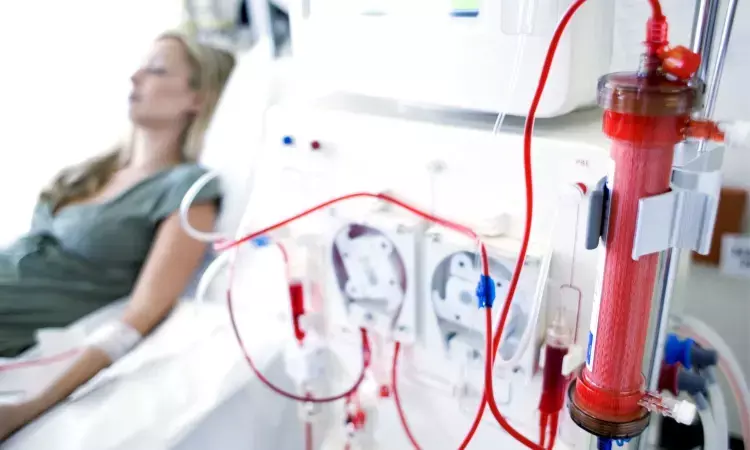- Home
- Medical news & Guidelines
- Anesthesiology
- Cardiology and CTVS
- Critical Care
- Dentistry
- Dermatology
- Diabetes and Endocrinology
- ENT
- Gastroenterology
- Medicine
- Nephrology
- Neurology
- Obstretics-Gynaecology
- Oncology
- Ophthalmology
- Orthopaedics
- Pediatrics-Neonatology
- Psychiatry
- Pulmonology
- Radiology
- Surgery
- Urology
- Laboratory Medicine
- Diet
- Nursing
- Paramedical
- Physiotherapy
- Health news
- Fact Check
- Bone Health Fact Check
- Brain Health Fact Check
- Cancer Related Fact Check
- Child Care Fact Check
- Dental and oral health fact check
- Diabetes and metabolic health fact check
- Diet and Nutrition Fact Check
- Eye and ENT Care Fact Check
- Fitness fact check
- Gut health fact check
- Heart health fact check
- Kidney health fact check
- Medical education fact check
- Men's health fact check
- Respiratory fact check
- Skin and hair care fact check
- Vaccine and Immunization fact check
- Women's health fact check
- AYUSH
- State News
- Andaman and Nicobar Islands
- Andhra Pradesh
- Arunachal Pradesh
- Assam
- Bihar
- Chandigarh
- Chattisgarh
- Dadra and Nagar Haveli
- Daman and Diu
- Delhi
- Goa
- Gujarat
- Haryana
- Himachal Pradesh
- Jammu & Kashmir
- Jharkhand
- Karnataka
- Kerala
- Ladakh
- Lakshadweep
- Madhya Pradesh
- Maharashtra
- Manipur
- Meghalaya
- Mizoram
- Nagaland
- Odisha
- Puducherry
- Punjab
- Rajasthan
- Sikkim
- Tamil Nadu
- Telangana
- Tripura
- Uttar Pradesh
- Uttrakhand
- West Bengal
- Medical Education
- Industry
Pain Coping Skills manage pain and Improve Quality of Life for Hemodialysis Patients: JAMA

People undergoing hemodialysis for kidney failure often experience chronic pain related to their condition. However, managing this pain with opioid medication and other conventional treatments can be challenging.
A recent study published in JAMA Internal Medicine found that offering pain coping skills training (PCST) significantly reduced suffering and improved the quality of life for these patients.
“This is particularly important for these patients, since the therapeutic choices for pain management are limited, and the use of opioids has been shown to be associated with poor outcomes in this group,” the study notes.
The randomized controlled study enrolled 643 participants from 16 medical centers and 103 dialysis clinics in The HOPE Consortium, an ongoing multi-site study exploring new treatments for dialysis patients.
Twenty-two New Mexicans – many of them Native American – participated in UNM’s arm of the study, Unruh said.
“New Mexico played a large role in the trial,” he said. “We served as the primary outcomes measurement core and New Mexico had a supplement to recruit from rural clinics with a focus on our underrepresented populations.”
Multiple factors likely contribute to dialysis-related pain. Patients tend to be older and living with arthritis, diabetes, peripheral neuropathy and back pain, he said.
“Dialysis by itself may contribute, either directly or indirectly, like having uremic toxins in your bloodstream,” Unruh said. “The process of going to dialysis and having a needle stuck in your arm may be challenging for some people to deal with.”
Doctors face challenges in treating dialysis-related pain because patients have kidney failure. “We are kind of loathe to use nonsteroidal anti-inflammatory agents, and in general we avoid opioids,” he said. “Certain opioids are better than others, but a lot of them are cleared in part from the kidneys. You kind of have your hands tied.”
Half of the study participants were randomly assigned to receive the PCST intervention, while the other was assigned to receive usual care. The PCST consisted of 45-minute coaching sessions by counselors delivered via phone or video for 12 weeks, followed by an additional 12 weeks of daily automated interactive voice response sessions to monitor the participants’ progress.
The content included modules addressing pain-related anxiety, stress and sleep difficulties along with CBT, mindfulness, pain education, experiential training, with the overarching goal of enhancing self-efficacy for applying the acquired coping skills.
“It's like a recipe with 12 components,” Unruh said. “You talk about strategies, and focus on reframing and limiting catastrophizing. You'll do some mindfulness meditation, and then you'll talk about addressing, anxiety and depression and strategies to prevent backsliding.”
The study found that patients who underwent the PCST intervention showed modest improvements in the extent to which pain interfered with their daily activities, he said. “The relevance would be that, if I'm seeing someone in a clinic who has chronic pain, rather than prescribing an opioid, I could refer them to a psychologist who practices CBT, and they could kind of adopt it.”
The study is an example of how research can lead to improvements in clinical care, Unruh said. “It is great to see these results in press and offer alternatives other than opioids to our patients on dialysis for treatment of chronic pain.”
Reference:
Dember LM, Hsu JY, Mehrotra R, et al. Pain Coping Skills Training for Patients Receiving Hemodialysis: The HOPE Consortium Randomized Clinical Trial. JAMA Intern Med. Published online December 30, 2024. doi:10.1001/jamainternmed.2024.7140
Dr Kamal Kant Kohli-MBBS, DTCD- a chest specialist with more than 30 years of practice and a flair for writing clinical articles, Dr Kamal Kant Kohli joined Medical Dialogues as a Chief Editor of Medical News. Besides writing articles, as an editor, he proofreads and verifies all the medical content published on Medical Dialogues including those coming from journals, studies,medical conferences,guidelines etc. Email: drkohli@medicaldialogues.in. Contact no. 011-43720751


